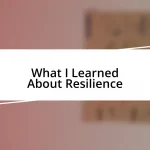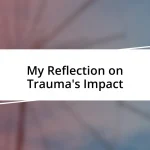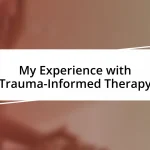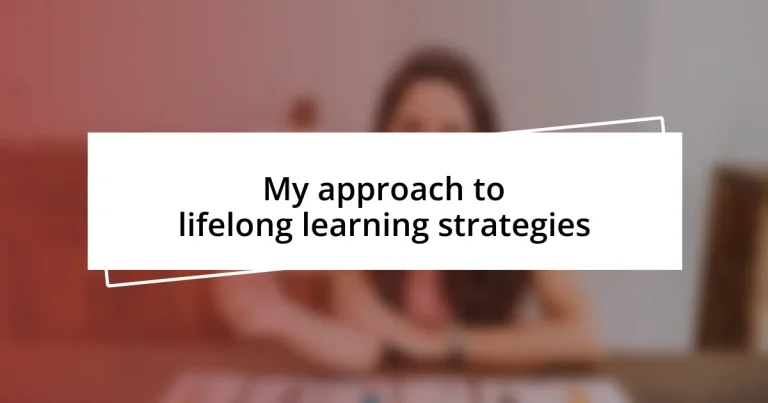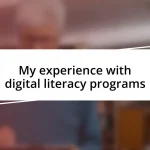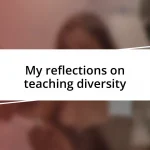Key takeaways:
- Lifelong learning is enriched by reflection, adaptability, and community involvement, enhancing personal and professional growth.
- Identifying specific, aligned learning goals and reassessing them regularly can transform your learning journey and maintain motivation.
- Leveraging technology, such as online courses and mobile apps, allows for flexible, personalized learning experiences.
- Creating a supportive environment, including constructive feedback and an inspiring space, is essential for fostering effective learning.
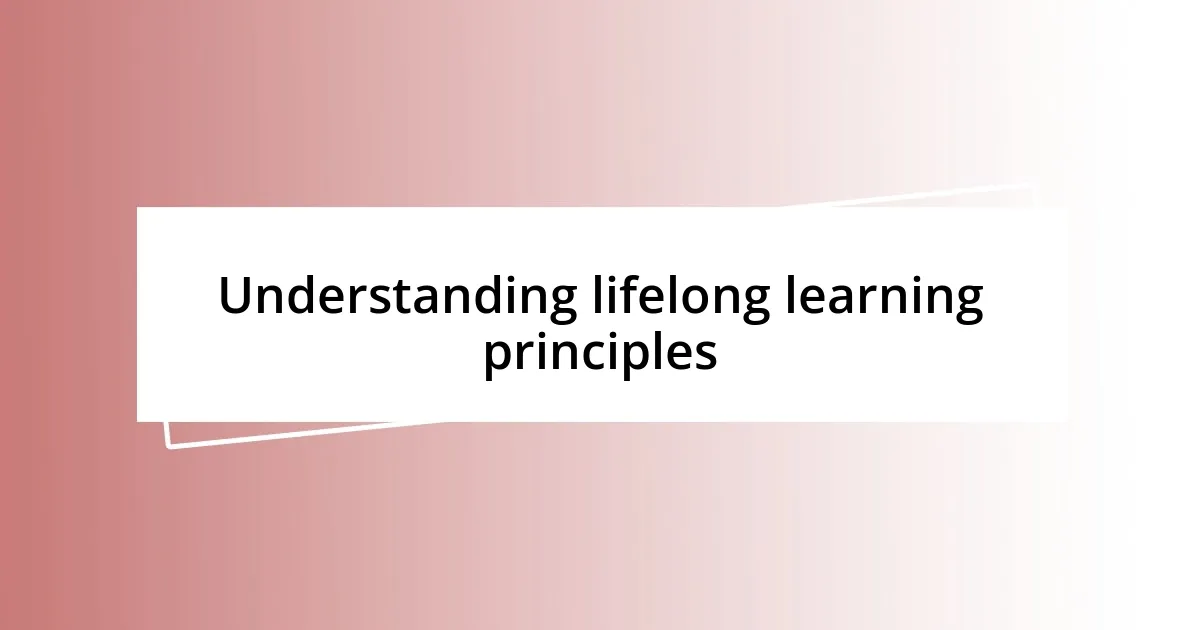
Understanding lifelong learning principles
Lifelong learning isn’t merely an academic exercise; it’s an enriching journey that can enhance every facet of our lives. I often reflect on my own experiences—like the time I decided to take up photography. Initially, I stumbled through with basic techniques, but as I absorbed feedback and practiced, I began to see my perspective shift and grow. Isn’t it incredible how a simple hobby can transform into a profound understanding of capturing moments?
A core principle of lifelong learning is reflection. Have you ever paused to consider how far you’ve come in your learning journey? I remember taking a moment after finishing a challenging online course, realizing that the lessons I had absorbed were not just theoretical but applicable to my work. This realization sparked a deeper appreciation for the ongoing process of learning. By reflecting on our experiences, we create opportunities to identify what works, what doesn’t, and how we can improve moving forward.
Lastly, embracing adaptability is crucial. Life is constantly changing, and being open to new ideas can significantly enhance our learning experience. For example, when the pandemic hit, I found myself shifting from in-person workshops to virtual ones. Initially, it was a struggle, but I quickly learned to navigate new platforms and discovered the joys of connecting with a broader audience. So, how adaptable are you in your own life? Recognizing that learning doesn’t have a fixed path can foster a much richer and more varied learning environment.
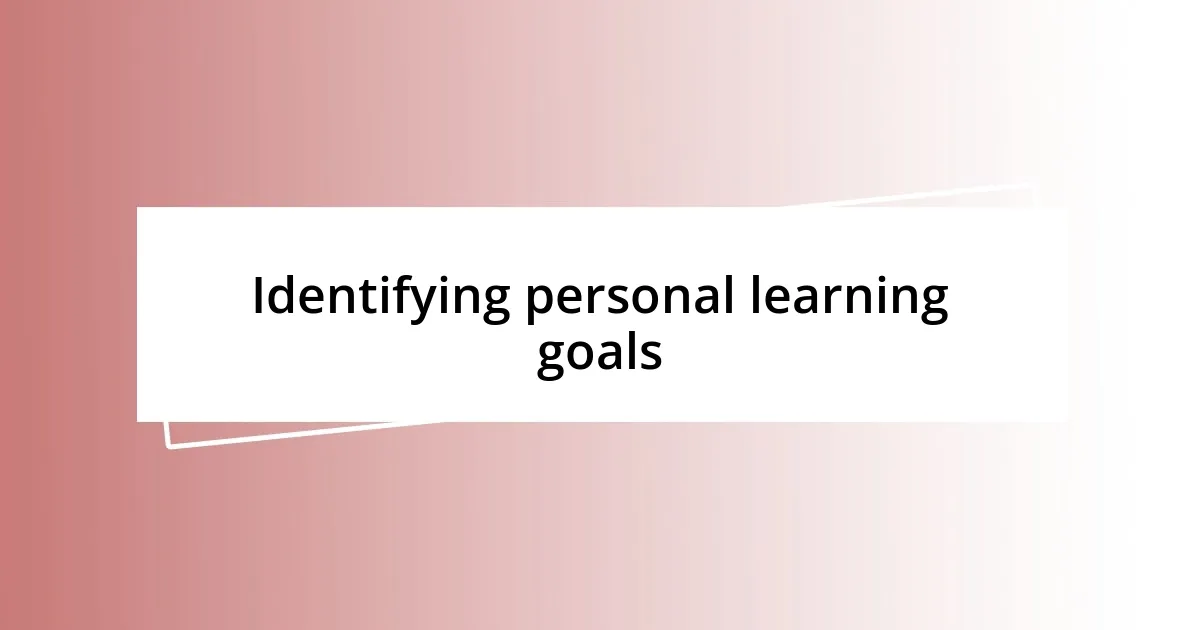
Identifying personal learning goals
Identifying personal learning goals is a transformative process I’ve come to value deeply. I remember setting a goal to enhance my public speaking skills after feeling nervous every time I had to present. By specifically defining what I wanted to achieve—like speaking confidently without notes—I was able to create a targeted plan that led me to join a local Toastmasters group. This not only made my goal tangible but also provided me with a supportive community to grow alongside.
It’s essential to ensure that your learning goals align with your genuine interests and aspirations. For instance, during a particularly challenging time in my career, I realized that I wanted to transition into a management role. I took the time to outline the specific skills I needed, such as conflict resolution and team motivation. This clarity allowed me to seek out workshops and mentorships, making my learning journey not just focused on filling gaps but genuinely fulfilling my career aspirations.
Finally, I’ve found that revisiting and assessing your goals is crucial. Life shifts and so do our interests. A few months back, I reassessed my learning objectives and shifted from technical skills to more creative pursuits like digital storytelling. This pivot reignited my passion for learning and opened up a wealth of new opportunities. Reflecting on what excites you can guide your journey in lifelong learning; it’s a personal evolution that deserves attention.
| Characteristics of Effective Learning Goals | Personal Reflection |
|---|---|
| Specificity | Clearly defining what I want to learn made all the difference in my focus. |
| Alignment with Interests | When my goals matched my passions, the learning process felt enjoyable rather than obligatory. |
| Flexibility | Being open to change allowed me to pivot my learning in directions that truly excited me. |
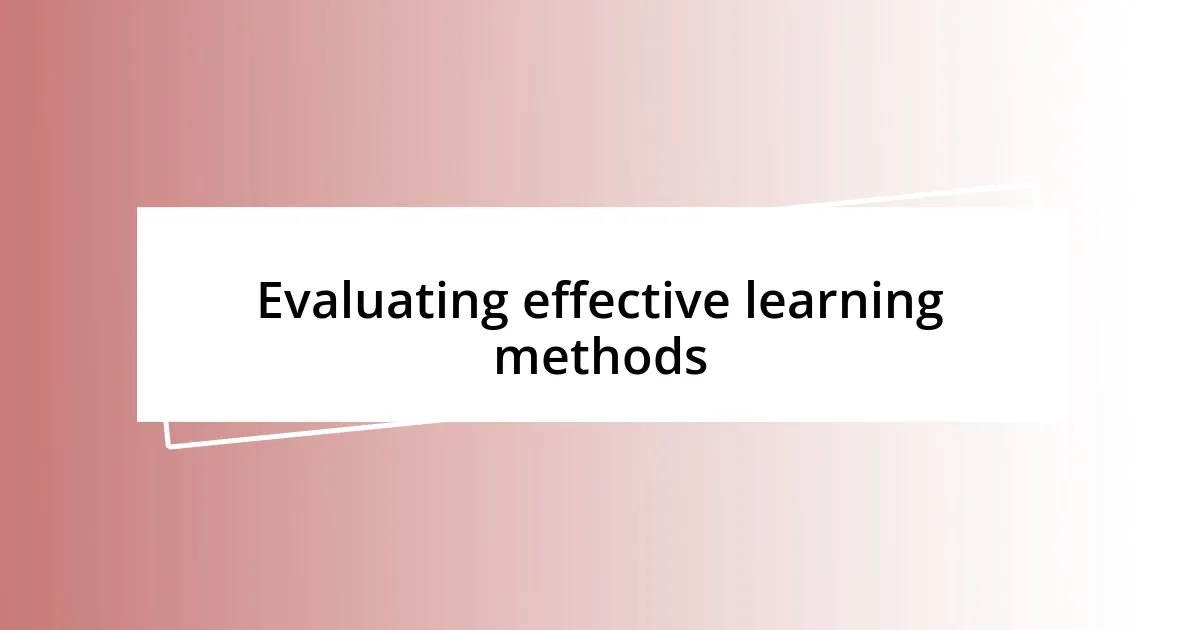
Evaluating effective learning methods
Evaluating effective learning methods requires a personal touch that resonates deeply with our individual experiences. I recall experimenting with various strategies while mastering a new language. While flashcards were useful, it was the immersive experience, like chatting with native speakers, that ultimately accelerated my progress. It reminded me that sometimes the most effective methods are the ones that evoke real-life situations rather than sticking strictly to traditional techniques.
To help in this evaluation process, I consider the following factors:
- Engagement: Methods that actively captivate my attention often lead to better retention.
- Adaptability: I need to think about how easily a learning method can be adjusted to fit my unique style.
- Feedback: I value continuous feedback as it helps me gauge my understanding and make necessary adjustments.
- Practical Application: I tend to remember things better when I can apply what I’ve learned in real-world contexts.
- Community Involvement: Sharing my learning journey with others––like involving myself in study groups––can enhance motivation and foster collaborative insights.
Whenever I evaluate new learning methods, it’s all about finding that sweet spot where the process feels organic and aligns with how I naturally learn best. If I can feel the excitement bubbling inside as I explore a new strategy, I know I’m on the right path.
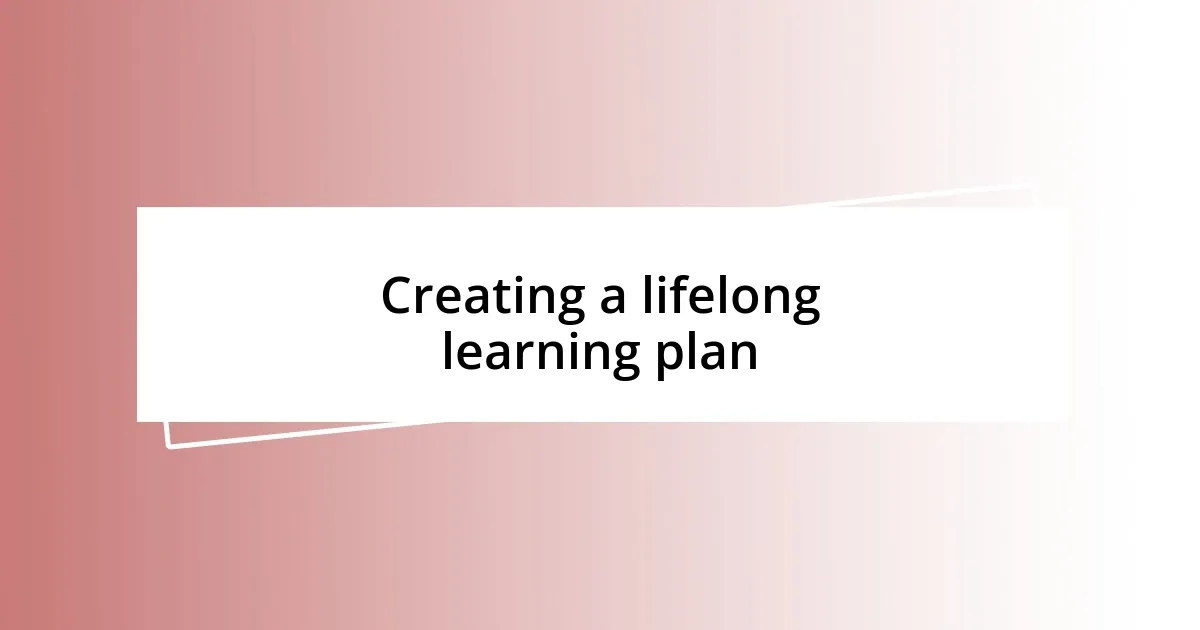
Creating a lifelong learning plan
Creating a lifelong learning plan is like crafting a roadmap for your personal and professional growth. I remember when I first sat down to create mine; it felt a bit overwhelming. I asked myself, “Where do I even start?” What helped was breaking down my aspirations into smaller, manageable chunks. For instance, I identified the skill sets that excited me, such as graphic design and entrepreneurship, and set clear milestones to track my progress.
Another key aspect of planning is prioritizing your learning activities based on urgency and interest. I found that focusing on topics that sparked my curiosity made the journey more enjoyable. One year, I dedicated my weekends to online courses in digital marketing. The thrill of applying what I learned, like launching my own blog, turned theoretical knowledge into practical experience. Has anyone else experienced that moment when theory clicks into real-world application? It’s incredibly fulfilling and keeps the motivation alive.
Don’t forget the importance of accountability in your learning plan. I once joined a study group where every member shared their goals and progress regularly. This connection fostered a sense of responsibility towards each other, and honestly, it transformed my learning experience. Being part of a community not only kept me on track but also offered perspectives I hadn’t considered before. When your learning journey intertwines with others, it can become a vibrant and rich tapestry of shared knowledge and growth.
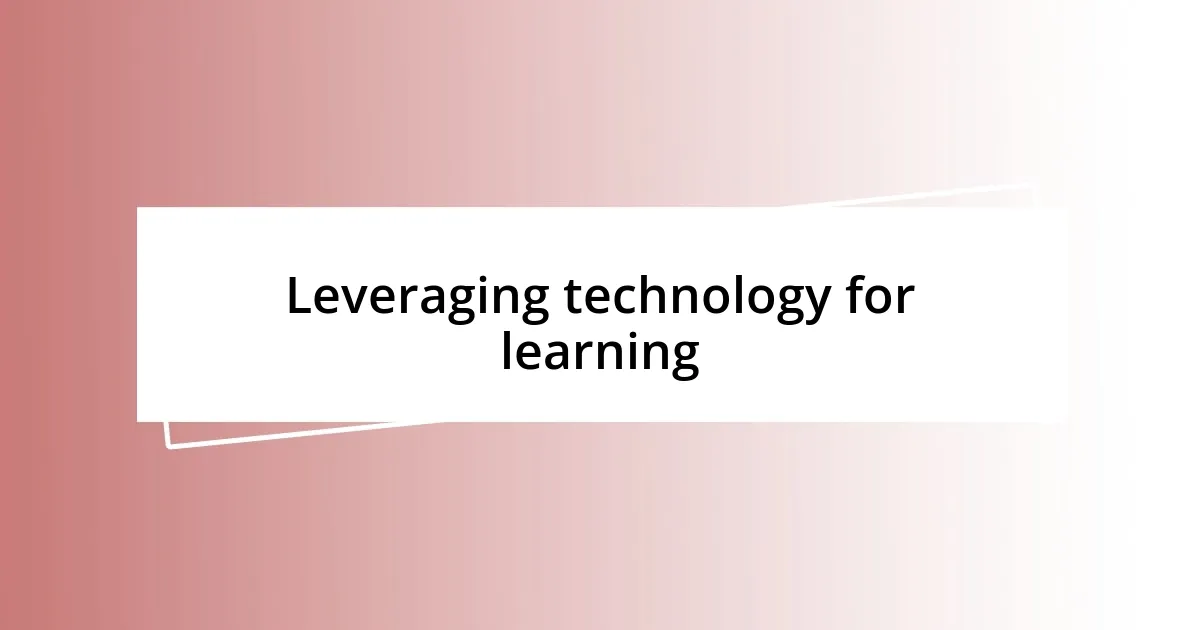
Leveraging technology for learning
Leveraging technology in my learning journey has opened up a world of possibilities. I recall one time when I discovered a mobile app that allowed me to practice coding on the go. It transformed my daily commute into a productive learning session. That little change made me wonder: how often do we overlook the potential of tools that fit so seamlessly into our lives?
There’s something magical about online courses that allow you to learn at your own pace. I remember signing up for a photography course and being able to watch each lesson multiple times until I truly grasped the concepts. This flexibility not only catered to my learning style but also reduced the pressure often felt in traditional classroom settings. Did you ever wish you could rewind and replay a lecture? With technology, that’s not just a dream anymore.
Lastly, I’ve found social media platforms to be a treasure trove of learning resources. For instance, I follow experts in fields I’m passionate about, and their shared insights are constantly inspiring me. It feels like learning is woven into my everyday life, and it makes me question: how much are we really using technology to connect and learn from each other? In my experience, those connections often lead to rich discussions and deeper understanding, reinforcing the idea that learning can be a vibrant community experience, even in a virtual space.
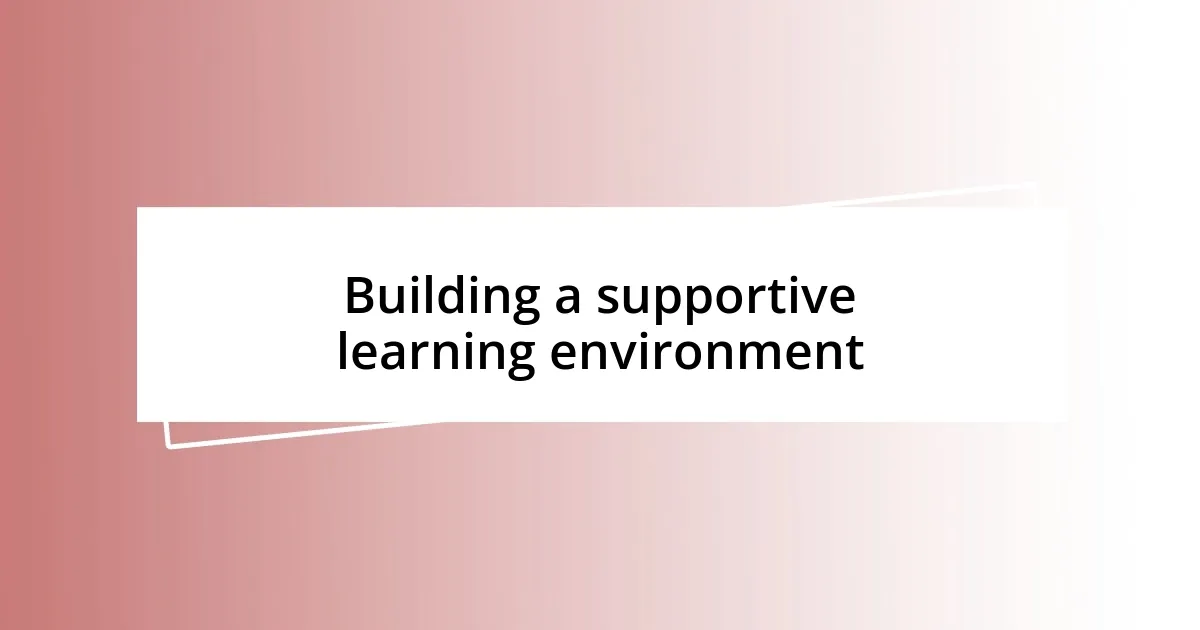
Building a supportive learning environment
Creating a supportive learning environment starts with surrounding yourself with people who inspire and encourage you. I once joined a local book club filled with enthusiastic readers who not only shared recommendations but also sparked deep conversations. How did that make me feel? It was invigorating! I realized that learning in a group setting offers a distinct energy, where everyone’s experiences intertwine to create a richer understanding of the material.
The space where you learn matters too. I achieved significant growth when I transformed a corner of my home into a dedicated study nook. It was small but infused with personal touches—quotes on the walls and a comfy chair. Every time I settled in, I felt an unspoken commitment to my learning. Isn’t it amazing how a simple shift in environment can heighten focus and motivation? When the space reflects our aspirations, it becomes a sanctuary for creativity and growth.
Lastly, feedback is crucial in a supportive learning environment. I remember presenting a project to a mentor who offered constructive criticism instead of judgment. That experience taught me the importance of viewing feedback as a learning opportunity rather than a setback. Have you ever felt hesitant to share your work for fear of negative responses? Embracing feedback, especially from trusted sources, ultimately pushes us to refine our skills and develop resilience in the face of challenges.
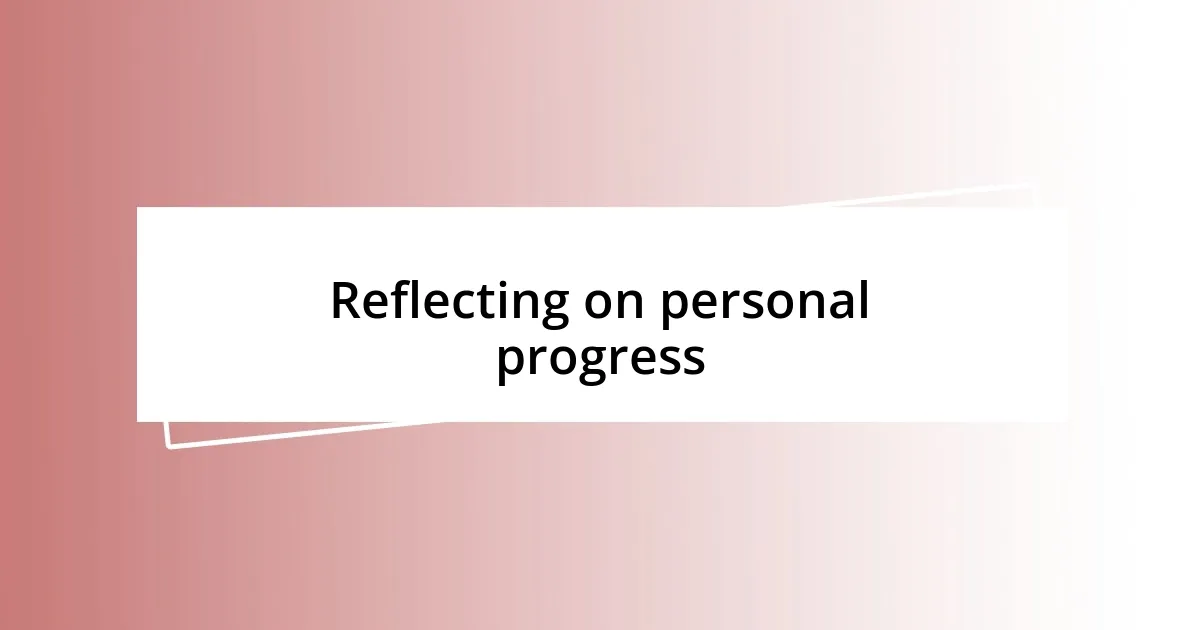
Reflecting on personal progress
Reflecting on progress can be a profound exercise. I often find myself reviewing my achievements at the end of the month, and there’s something incredibly fulfilling about acknowledging how far I’ve come. It’s like looking back at a winding road and realizing I’ve navigated some steep hills successfully. Have you ever taken the time to celebrate even the tiniest victories in your own journey?
One memory that stands out is when I decided to track my learning goals using a journal. As I flipped through the pages, I discovered a list of skills I had once considered impossible. Each completed task was like a mini-celebration; it fueled my motivation. It makes me wonder: how often do we dismiss our progress simply because we’re too focused on what’s still on our to-do lists?
Sometimes, it’s easy to overlook progress when we’re caught up in the hustle. However, those moments of pause are crucial. I remember confronting an obstacle that lingered for weeks. I took a step back and realized how much I had actually learned in the process of overcoming it. Reflecting on these setbacks can be incredibly enlightening; it reveals our resilience and highlights the lessons we gain along the way. What have you uncovered about yourself when reflecting on your own challenges?
